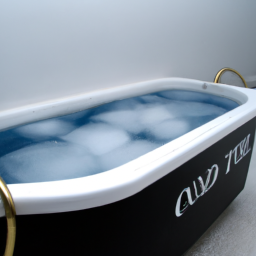Have you ever wondered about the benefits of cold tubs?
Maybe you’ve seen athletes or celebrities talking about them, or maybe you’re just curious about trying something new. Well, you’re in luck because in this article, we’re going to explore the many benefits of cold tubs and how they can improve your overall well-being.
By the end, you’ll have a better understanding of why so many people are incorporating cold tubs into their daily routines. Cold tubs, also known as cold therapy or ice baths, have been used for centuries as a way to promote healing and recovery.
The idea behind cold tubs is that exposing your body to cold temperatures can have numerous positive effects. For example, cold therapy is believed to reduce inflammation, decrease muscle soreness, and increase circulation. It can also help to boost the immune system, increase energy levels, and even improve sleep quality.
In addition, cold tubs are often used by athletes to enhance performance and speed up recovery after intense workouts or competitions. Curious to learn more? Keep reading to discover the answers to some frequently asked questions about cold tubs.
Cold Tubs
What are Cold Tubs?
If you’ve ever watched professional athletes in action, you might have noticed them submerging themselves in large tubs filled with ice-cold water. These are known as cold tubs, and they have gained popularity in the world of sports and fitness due to their numerous benefits for recovery, muscle relief, and overall well-being.
How do Cold Tubs work?
Cold tubs, also called ice baths or cold water immersion, involve immersing your body in water that is typically set to a temperature between 50 and 55 degrees Fahrenheit (10 to 13 degrees Celsius) for a designated period of time. This exposure to cold water triggers several physiological responses in your body, which in turn provide various benefits.
Benefits of Cold Tubs
Recovery and Muscle Relief
One of the primary benefits of cold tubs is their ability to aid in post-workout recovery and muscle relief. The cold water constricts blood vessels, helping to reduce inflammation and muscle soreness. When your body is exposed to cold temperatures, it also activates the parasympathetic nervous system, which promotes relaxation and helps relieve tension in muscles.
Improved Athletic Performance
Cold tubs are widely used by athletes to improve their performance and enhance recovery between training sessions. By reducing muscle soreness and inflammation, cold tubs can help athletes bounce back faster and train at a higher intensity. Cold water immersion also increases blood circulation, delivering oxygen and nutrients to the muscles, ultimately improving their function.
Reduced Inflammation
Inflammation is a natural response of the body to injury or intense exercise. While some level of inflammation is necessary for tissue repair, excessive inflammation can impede recovery progress. Cold tubs help regulate the body’s inflammatory response by reducing the production of pro-inflammatory substances and promoting the release of anti-inflammatory molecules, thus aiding in the reduction of inflammation.
Enhanced Sleep Quality
A good night’s sleep is crucial for overall health and performance. Cold tub therapy has been found to improve sleep quality by lowering the body’s core temperature. Studies have shown that individuals who use cold tubs before bedtime experience improved sleep duration and quality, leading to increased daytime alertness and better cognitive function.
Boosted Immune System
Cold tubs have been shown to have a positive impact on the immune system. Cold water immersion enhances the production of white blood cells, which are responsible for fighting off infections and foreign substances in the body. By regularly exposing yourself to cold water, you can strengthen your immune system and reduce the risk of falling ill.
Precautions and Safety Tips
While using cold tubs can be highly beneficial, it is essential to take certain precautions to ensure your safety and well-being:
- Consult with a healthcare professional: If you have any pre-existing medical conditions or if you are pregnant, it is crucial to consult with your healthcare provider before using cold tubs.
- Gradual exposure: If you are new to cold tub therapy, start with shorter durations and gradually increase the time. This allows your body to adjust to the cold temperature without putting excessive stress on your system.
- Monitor your body: Pay close attention to how your body reacts to cold tub therapy. If you experience any discomfort, dizziness, or irregular heartbeat, exit the tub immediately and seek medical attention if necessary.
- Hydrate: Cold water immersion can cause dehydration, so make sure to drink plenty of fluids before and after using a cold tub.
Frequently Asked Questions (FAQs)
Q: How long should I stay in a cold tub?
A: The recommended duration for cold tub therapy is typically between 10 to 15 minutes. However, beginners can start with shorter durations and gradually increase the time as their body adapts to the cold temperature.
Q: How often can I use a cold tub?
A: The frequency of cold tub sessions depends on various factors, including your level of physical activity and recovery needs. Aim for two to three sessions per week, allowing at least a day of rest in between.
Q: Can I use ice packs instead of a cold tub?
A: While ice packs can provide localized relief, cold tub therapy offers the benefits of whole-body immersion, which promotes overall recovery and enhances circulation. Cold tubs are generally more effective than localized ice treatments.
Conclusion
Cold tubs, or ice baths, have proven to be a valuable tool for athletes and fitness enthusiasts looking to optimize their recovery and enhance their performance. By reducing inflammation, relieving muscle soreness, improving sleep quality, boosting the immune system, and aiding in overall recovery, cold tub therapy offers a natural and effective method for achieving peak physical condition.
emember to take precautions, consult with a healthcare professional if needed, and gradually introduce cold tub therapy into your routine for best results. So, why not take the plunge and explore the benefits of cold tubs for yourself?

